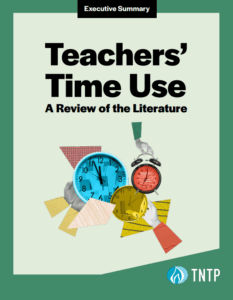As an education nonprofit, it might seem strange that in our recent report, Shortchanged: The Hidden Costs of Lockstep Teacher Pay, we argued that districts should reduce or eliminate pay bumps for teachers with master’s degrees, in favor of paying teachers more based on their actual success in the classroom.
But here’s the thing: It’s not that we hate master’s degrees (many of us have them!); it’s that the money districts are putting toward them is not a great investment, and it could be used for better purposes that would serve the same well-intentioned goal—attracting talented people into the teaching profession and rewarding the advanced skills and knowledge that help students learn. School leaders need compensation systems that are flexible enough to allow them to attract the teachers they really want in their schools—whether that means promising early career teachers, veterans with proven track records of success in high-needs classrooms, or teachers with advanced degrees in the math and science subjects they’ll be teaching.
But automatic pay raises for master’s degrees aren’t a good use of funding—and they’re costing districts dearly. Research shows that advanced degrees have little to no measurable effect on a teacher’s ability to help students learn. And yet the latest estimate indicates that school districts currently spend some $14.8 billion on raises for teachers due to master’s degrees alone, a figure that is increasing much faster than the rate of inflation. According to the National Center for Education Statistics, salary schedules pay (on average) an additional 11 percent for master’s degrees and 17 percent for a doctorate, regardless of whether the degree is in the same subject the teacher is teaching. And 90 percent of the time, they are not. By not awarding automatic raises for advanced degrees, districts could save huge amounts of money that could be used in more flexible ways to attract and retain great teachers.
Our push for states, districts and charters to pay teachers on the basis of their actual successes with students doesn’t mean that we think higher education is worthless. The opposite is true, in fact. We want to see more school districts invest in targeted, strategic continuing education and development for teachers that matches district priorities and is likely to produce results for students.
For example, some studies have shown that specific types of degrees can in fact influence teacher effectiveness. This is especially true in technical subjects like math and science. An Algebra II teacher who holds a master’s degree in mathematics is more likely to see better student outcomes than a high school math teacher without a master’s degree, or who holds a master’s degree in a subject other than math, like education or English.
If school districts saved funds by shifting away from lockstep compensation systems, one strategic use of freed-up money might be providing incentives to attract and retain math teachers with advanced degrees in mathematics to the classrooms where they are needed most. Or if states were to think differently about certification and licensing laws too, a more flexible approach to compensation could mean hiring a professional scientist or mathematician to teach a few sections of high school calculus or physics. At present, less than a third of schools serving the most African-American and Latino students offer calculus, and less than half offer physics. With more flexibility in compensating their teachers, school leaders would be more able to attract the talented STEM teachers they need to their classrooms.
On the whole, we want to see teacher compensation systems shift toward being more flexible, with less money tied up in step-and-lane salary increases and more of it available to be spent in strategic ways that affect student outcomes. $14.8 billion isn’t pocket change: It’s real money that could be used to pay for fantastic teaching in every classroom—whether that means raises for math and science teachers who hold subject-specific master’s degrees or for other educational credentials that have a real impact on teachers’ effectiveness, stipends that incentivize top teachers to take hard-to-staff roles, or signing bonuses that attract career-changers with the high-level skills to help students master rigorous coursework.
With the release of Shortchanged, we are eager to see more school systems paying teachers differently. Let’s pay for advanced degrees when they matter, and redirect those big savings toward other tools to attract and retain excellent teachers to work in every classroom.








